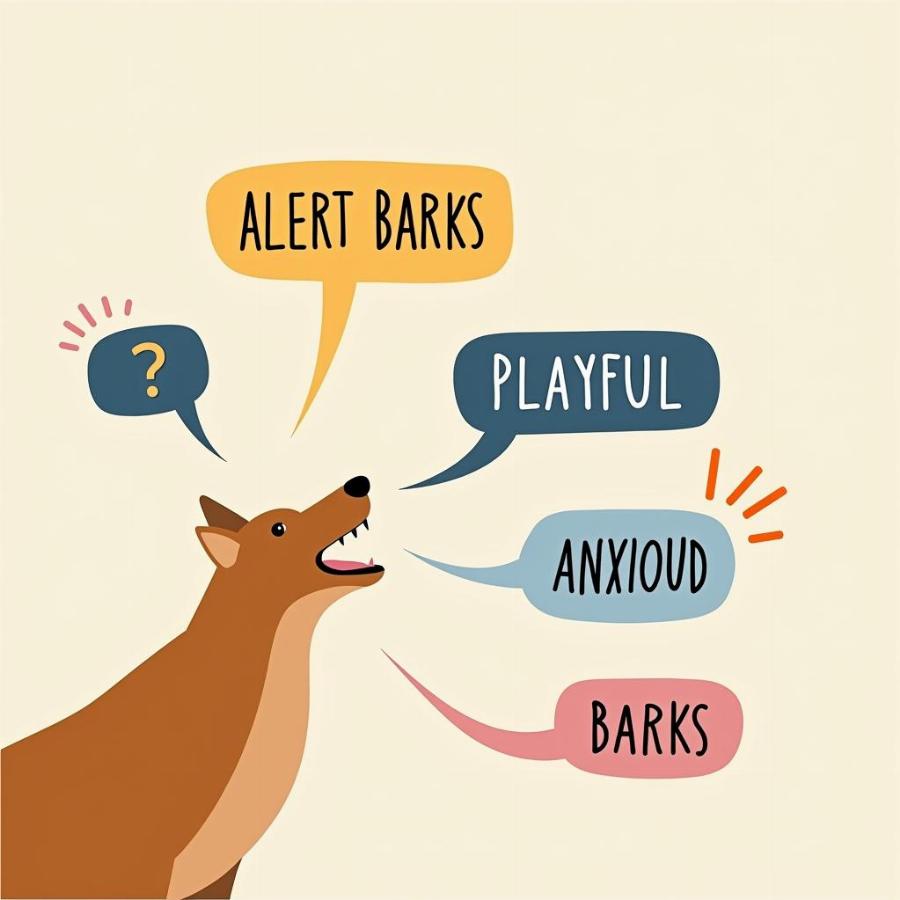Barking is a natural form of communication for dogs, just like talking is for humans. While occasional barking is normal, excessive barking dog noise can become a nuisance for both owners and neighbors. Understanding the reasons behind your dog’s barking is the first step to addressing the issue and finding solutions that work for everyone. This article dives into the various reasons why dogs bark, offering practical tips and advice for managing barking dog noise effectively.
Decoding the Different Types of Barking Dog Noise
 Giải mã tiếng sủa của chó
Giải mã tiếng sủa của chó
Not all barks are created equal. A high-pitched, rapid bark might indicate excitement or playfulness, while a low, prolonged growl could signal aggression or fear. Recognizing the nuances in your dog’s barking can provide valuable insights into their emotional state and help you respond appropriately. For instance, a series of short, sharp barks might mean your dog is alerting you to something unusual, whereas a continuous, high-pitched whine could indicate anxiety or distress. Understanding these subtle differences is crucial for effective barking management.
Why is My Dog Barking Excessively?
Excessive barking dog noise can stem from a variety of reasons, ranging from boredom and loneliness to territoriality and anxiety. Identifying the underlying cause is essential for implementing the right strategies to curb excessive barking.
Territorial Barking
Many dogs bark to protect their territory – this includes your home, yard, and even the car. They might bark at strangers, other animals, or even passing vehicles. This type of barking is usually loud and assertive.
Alert Barking
As natural guardians, dogs often bark to alert their owners to anything unusual or potentially threatening. This could be the sound of the doorbell, an unfamiliar person approaching, or even a sudden noise.
Attention-Seeking Barking
Some dogs bark to get attention, whether it’s for playtime, treats, or simply a cuddle. This type of barking can be persistent and demanding.
Anxiety-Based Barking
Anxiety can manifest as excessive barking. Dogs suffering from separation anxiety, fear, or noise phobias often bark excessively as a coping mechanism.
Boredom and Loneliness
A bored or lonely dog may bark out of frustration or to release pent-up energy. This type of barking can be repetitive and monotonous.
How to Calm a Barking Dog
Once you’ve identified the reason behind your dog’s barking, you can start implementing strategies to manage it. Consistency and patience are key to achieving lasting results.
Training and Behavior Modification
Positive reinforcement training can be highly effective in addressing unwanted barking. Rewarding quiet behavior with treats, praise, or toys can help your dog understand what you expect of them.
Providing Enrichment and Exercise
A tired dog is a well-behaved dog. Regular exercise and mental stimulation can help reduce boredom and anxiety, leading to less barking. Puzzle toys, interactive games, and daily walks can make a significant difference. why does my dog go under the bed
Creating a Safe and Secure Environment
For dogs who bark due to anxiety, creating a safe and comfortable environment can help reduce their stress levels. This might involve providing a designated “safe space” where they can retreat when feeling overwhelmed. aging dog anxiety
Seeking Professional Help
If you’re struggling to manage your dog’s barking, consulting a certified dog trainer or behaviorist can be invaluable. They can provide personalized guidance and develop a tailored training plan for your dog’s specific needs. why is my dog digging at the carpet
Expert Insights on Managing Barking Dog Noise
“Understanding the root cause of barking is crucial,” says Dr. Emily Carter, a renowned veterinary behaviorist. “Treating the underlying issue, rather than just the symptom, is the key to long-term success.”
“Enrichment and exercise are essential for preventing boredom-related barking,” adds Dr. Carter. “A stimulated dog is less likely to bark excessively.”
Conclusion
Addressing barking dog noise requires patience, understanding, and a consistent approach. By identifying the underlying cause and implementing appropriate strategies, you can help your dog communicate more effectively and create a peaceful environment for everyone. Remember, barking is a natural behavior, but excessive barking can be managed with the right approach.
FAQ
- Is it normal for my dog to bark sometimes? Yes, occasional barking is perfectly normal for dogs. It’s their way of communicating.
- How can I tell if my dog’s barking is excessive? Excessive barking is usually persistent, disruptive, and occurs without a clear trigger.
- What are some common reasons for excessive barking? Boredom, anxiety, territoriality, and attention-seeking are common causes.
- Can training help reduce my dog’s barking? Yes, positive reinforcement training can be very effective in managing barking.
- When should I seek professional help for my dog’s barking? If your efforts to manage the barking are unsuccessful, consider consulting a certified dog trainer or behaviorist.
Related Articles
Beaut Dogs: Your Guide to the Canine World
Beaut Dogs is your one-stop resource for all things canine, offering expert advice and valuable insights into the world of dogs. From breed information and care guides to training tips and product recommendations, Beaut Dogs is committed to helping you provide the best possible care for your furry friend. When you need assistance, contact us by Email: [email protected] to get detailed and accurate answers from Beaut Dogs. Visit https://beautdogs.com today!